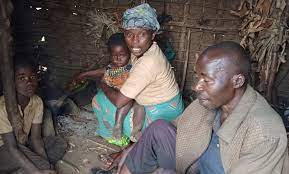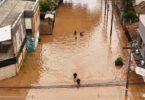KAHUZI-BIEGA NATIONAL PARK, Democratic Republic of Congo (Reuters): In the forested borderlands of eastern Congo, some members of an exiled hunter-gatherer community plan to move back into their ancestral land in a national park in protest over broken promises from the authorities they say put rare gorillas over their rights.
An estimated 10,000 indigenous Batwa live on the fringes of Kahuzi-Biega National Park (KBNP) in makeshift villages, struggling to survive without the land, healthcare, and other support pledged in 2019 as delayed compensation for their forced eviction when the park was created in 1970.
As barefoot children in ragged clothes wandered between the mud shacks of one Batwa settlement in June, residents described their fear of dying from hunger, childbirth or disease without legal access to their traditional livelihoods or the promised alternatives.
“In the park we found everything,” Nsimire Nankafu said in her one-room hut.
Her people once used their millennia-old knowledge of the forest to hunt and forage medicinal plants. Now, “when a child falls ill, we have nowhere to take them, so it’s death,” Nankafu said.
Outside, elder Djabuka Nzigire pulled up her shirt to show the loose skin on her stomach.
“I don’t look like someone who eats,” she said, describing how the Batwa are chased away from fields where they search for food because they have no land of their own.
“We are going to die like game caught in a trap.”
Their lament is echoed across Central Africa’s Congo basin rainforest. Over 90% of its 87,000 indigenous Batwa people have lost legal access to their native territory turned into conservation areas and are desperately poor, according to a 2009 United Nations report.
In 2019, Congolese authorities, including the environment ministry and provincial government, agreed to provide long-sought compensation to the Batwa around UNESCO-listed Kahuzi-Biega including agricultural land, clinics, and schools.
Over three years on, some Batwa are tired of waiting.
Speaking to Reuters on condition of anonymity, four Batwa chiefs in June said significant numbers of their community members were planning to return to live in the park secretly.
They did not share further details out of safety concerns.
On Tuesday, South Kivu Governor Theo Ngwabidje Kasi said efforts were ongoing to block such returns to the park. He also said local authorities lacked the funds to tackle the socio-economic root of the issue.
“It’s a problem that has become structural. The province doesn’t have the means,” he told Reuters, adding that it was pushing for more help from the central government.
The environment ministry did not reply to a request for comment.
CONSERVATION UNDER THREAT
The Batwa’s return threatens to escalate a dangerous standoff that the 2019 deal was meant to address.
A large-scale return to the park in 2018 led to a three-year campaign of forced expulsion that killed at least twenty Batwa members, according to Minority Rights Group International.
The New York-based Wildlife Conservation Society (WCS), which started co-managing the park in 2022 with the promise to look after indigenous interests, said the Batwa’s grievances were legitimate and it had been striving to respond.
Meanwhile, ranger patrols have been reinforced to protect the park from repeated violations of its boundaries, WCS told Reuters in late June. It said these are dealt with in compliance with the law and human rights commitments.
Local human rights and environmental experts say the authorities’ failure to fulfil promises to the Batwa had undermined efforts to protect the forest and its endangered species, including some of the last populations of eastern lowland gorilla.
Some of the Batwa around KBNP participate in the illegal poaching, mining and logging that are destroying the gorillas’ globally significant habitat. As a result, the conservation outlook for the park is critical, according to the International Union for Conservation of Nature.
“They have no choice because they are poverty-stricken,” said Josue Aruna, president of the province’s environmental civil society group, who does community outreach with the Batwa.
He said such threats would remain so long as the government failed to allocate the Batwa budget funds and land as promised in 2019.
“It is the Congolese state that has deprived this community of their natural habitat and so today they wander.”







